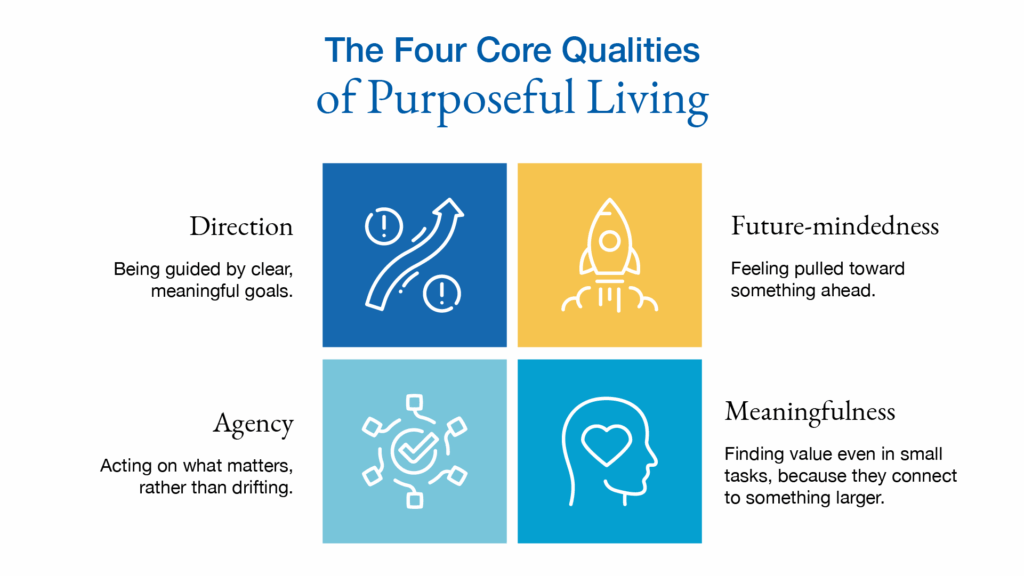What Does It Mean to Live Life with Purpose?
The scientific study of purpose in life is a relatively new but fast-growing field. For years, health research struggled not to just determine whether people had a sense of purpose—but figuring out how much and of what kind.
That changed with the work of psychologist Carolyn Ryff, a pioneer in the science of psychological well-being. Ryff developed a framework that included purpose as one of six core dimensions of human flourishing. Her “Psychological Wellbeing Scale” has given researchers what they long lacked: a reliable way to measure what was once considered too abstract to quantify.
The Link Between Purpose and Health
Ryff’s scale has since been used in major studies, including the Health and Retirement Study, which tracks thousands of older adults across the United States. These studies reveal a consistent pattern: individuals with a stronger sense of life purpose have lower risks of heart disease, cognitive decline, disability, and premature death.
Thus, purpose acts like a psychological “vital sign”—helping us navigate life, manage stress, and stay healthier as we age.
A Scientific Tool for Measuring Purpose in Life
Ryff’s seven-item scale captures various aspects of purposeful living. As a self-reflection exercise, consider how much you agree with each of these statements:
- I enjoy making plans for the future and working to make them a reality.
- My daily activities often seem trivial and unimportant to me.
- I am an active person in carrying out the plans I set for myself.
- I don’t have a good sense of what it is I’m trying to accomplish in life.
- I sometimes feel as if I’ve done all there is to do in life.
- I live life one day at a time and don’t really think about the future.
- I have a sense of direction and purpose in life.
Note: Items 2 and 4–6 are phrased negatively to help identify when a sense of purpose is lacking, offering a more complete picture of direction and motivation.
The Four Core Qualities of Purposeful Living
Together, these questions reflect four core dimensions of purposeful living:
- Direction – Being guided by clear, meaningful goals.
- Future-mindedness – Feeling pulled toward something ahead.
- Agency – Acting on what matters, rather than drifting.
- Meaningfulness – Finding value even in small tasks, because they connect to something larger.
These traits don’t just describe how purpose feels—they shape how it works. When we’re oriented toward the future, acting on what matters, and finding meaning in daily life, we cultivate the conditions for motivation, resilience, and well-being.

A Stepwise Link Between Purpose and Health
One of the most compelling demonstrations of the health impact of purpose comes from the Health and Retirement Study, which followed more than 6,000 adults over age 50 (1). Participants were divided into quartiles based on their reported sense of purpose in life.
The results revealed a striking stepwise relationship. Compared with individuals in the highest quartile of purpose, those in the lowest quartile had a nearly 2.5-fold greater risk of dying over the follow-up period compared to those in the highest quartile.
That kind of dose-response relationship mirrors what we see with other powerful health predictors, ranging from exercise, to optimism and social support. It confirms that purpose is not just a psychological asset—it’s a biological one.
Is There a Deeper Layer to Life Purpose?
Even with clear goals and meaningful work, some people experience something more—a sense of mission.
Mission is a deeper form of purpose, one that transcends personal achievement. It’s not just about what you do—it’s about why you’re here. Mission awakens you to something larger than yourself: a cause, a calling, or a vision of a better future that you feel compelled to help create. It’s infused with meaning, but also with momentum. It moves you—and moves through you.
Think of two people in the same profession—a teacher, nurse, or business owner. Both may find purpose in their work. But one feels deeply drawn to something visionary and urgent—whether it’s shaping minds, healing others, or solving a societal problem. That person isn’t just doing a job—they’re answering a call. That’s mission.
Why Living with a Sense of Mission Changes Everything
Living with a sense of mission shifts your center of gravity. It aligns your deepest values with your time, energy, and talents—and helps you focus on what matters most, not out of obligation, but from inner conviction. With mission, you’re not just reacting to life; you’re reaching for something higher. You’re building, creating, contributing.
If Ryff’s scale were expanded to capture this more outward-facing, aspirational form of purpose, the health benefits linked to purpose might prove even stronger.
Struggling to Find Your Purpose? Start Here
Of course, not everyone immediately knows what their mission is—and that’s okay. As Stephen Covey once said, “A mission is not something you invent; it’s something you detect.”
In the next post, we’ll explore how to detect your deeper sense of mission by noticing what I call “tuning fork moments”—experiences that resonate deeply, quietly, and personally. These moments don’t just make you feel good. They make you feel like you.
When you learn to recognize those moments, you start to uncover the life you’re meant to live—not just one that works, but one that calls.
REFERENCE:
- Alimujiang A, Wiensch A, Boss J, Fleischer NL, Mondul AM, McLean K, Mukherjee B, Pearce CL. Association Between Life Purpose and Mortality Among US Adults Older Than 50 Years. JAMA Netw Open. 2019 May 3;2(5):e194270.



